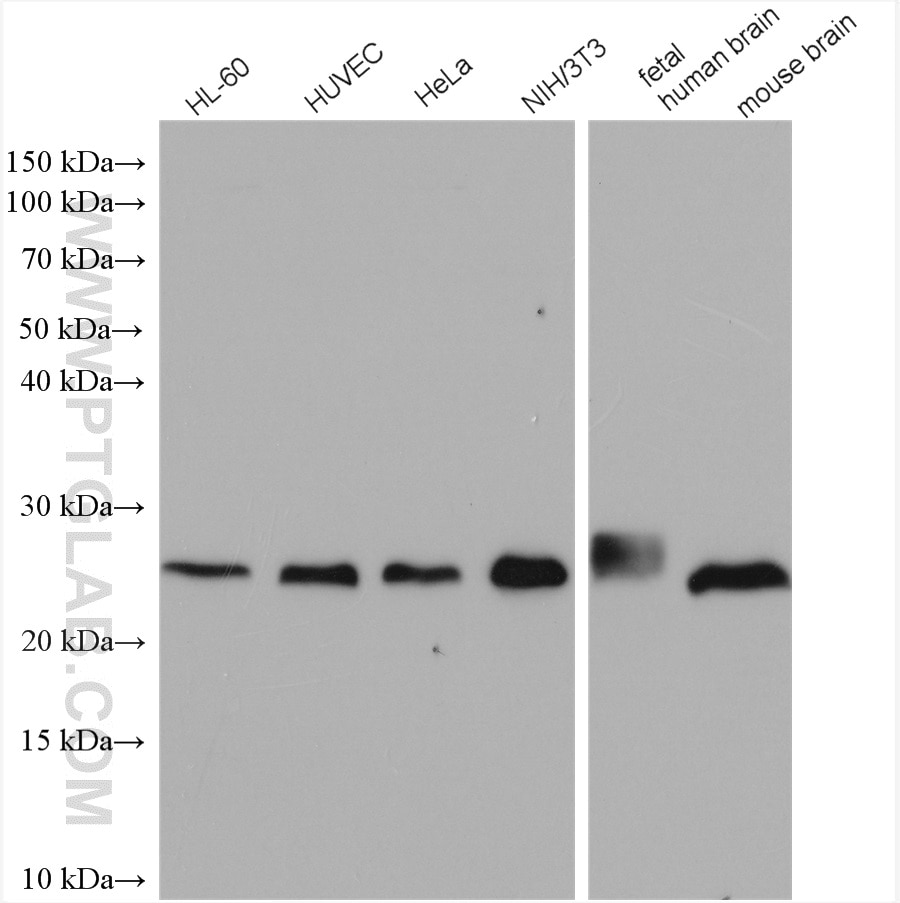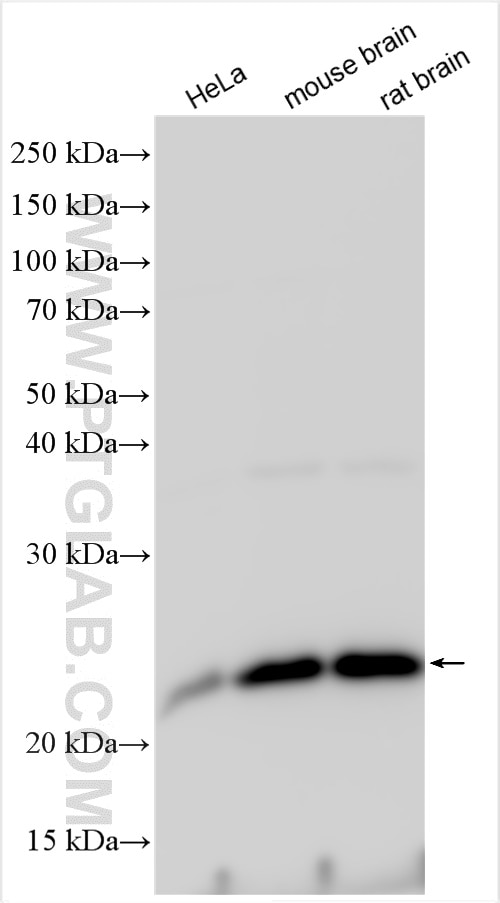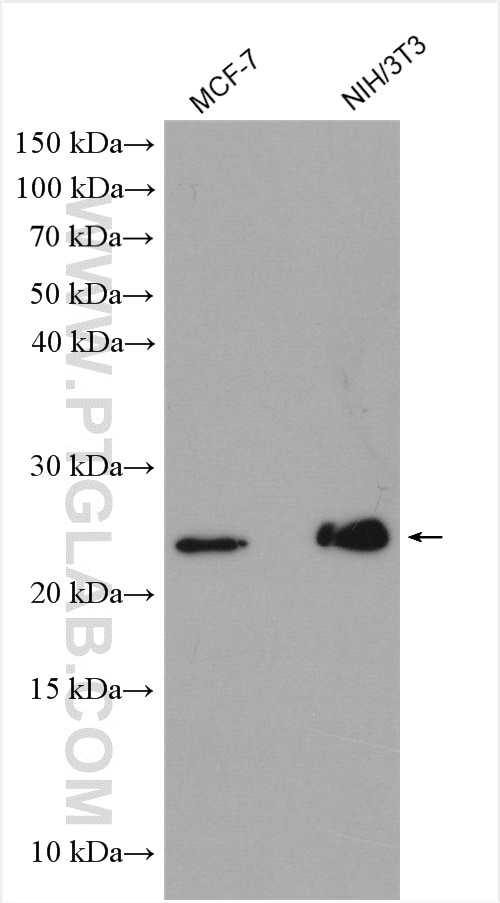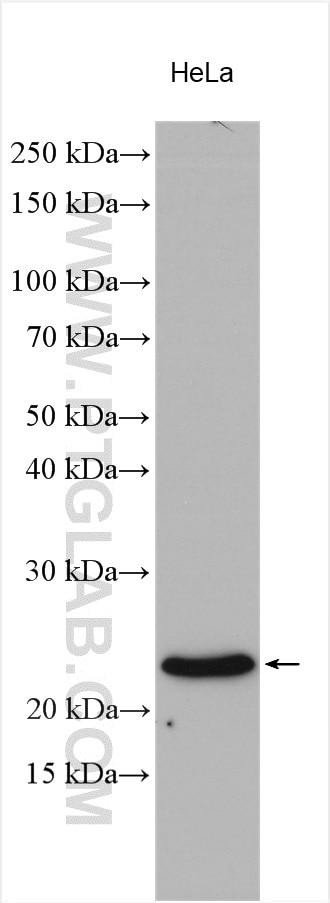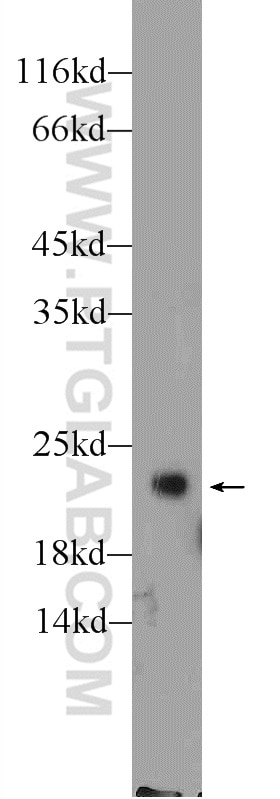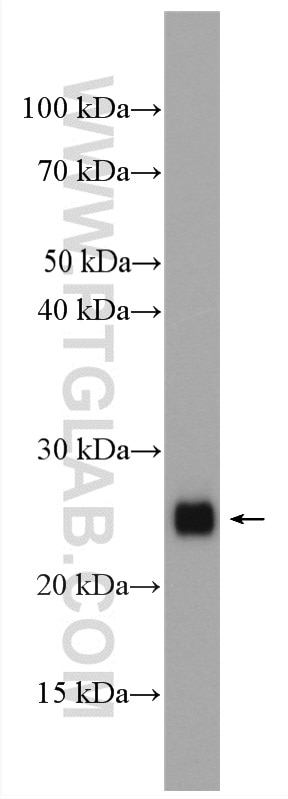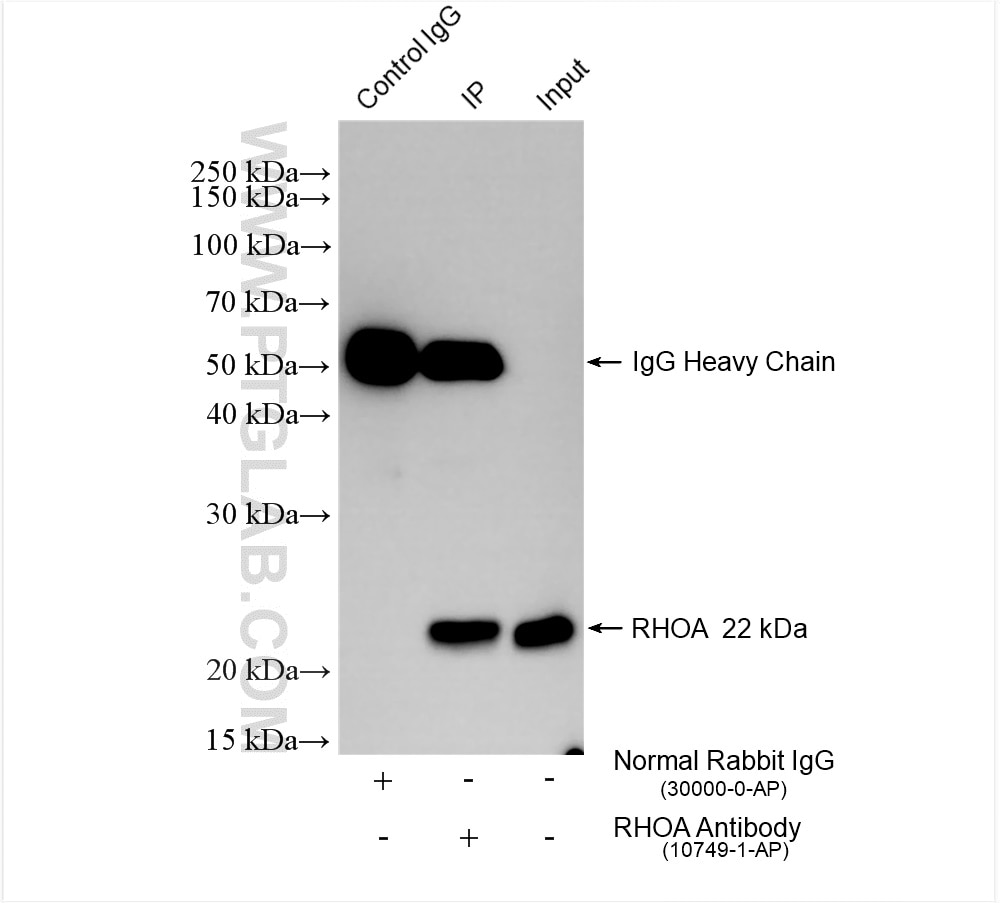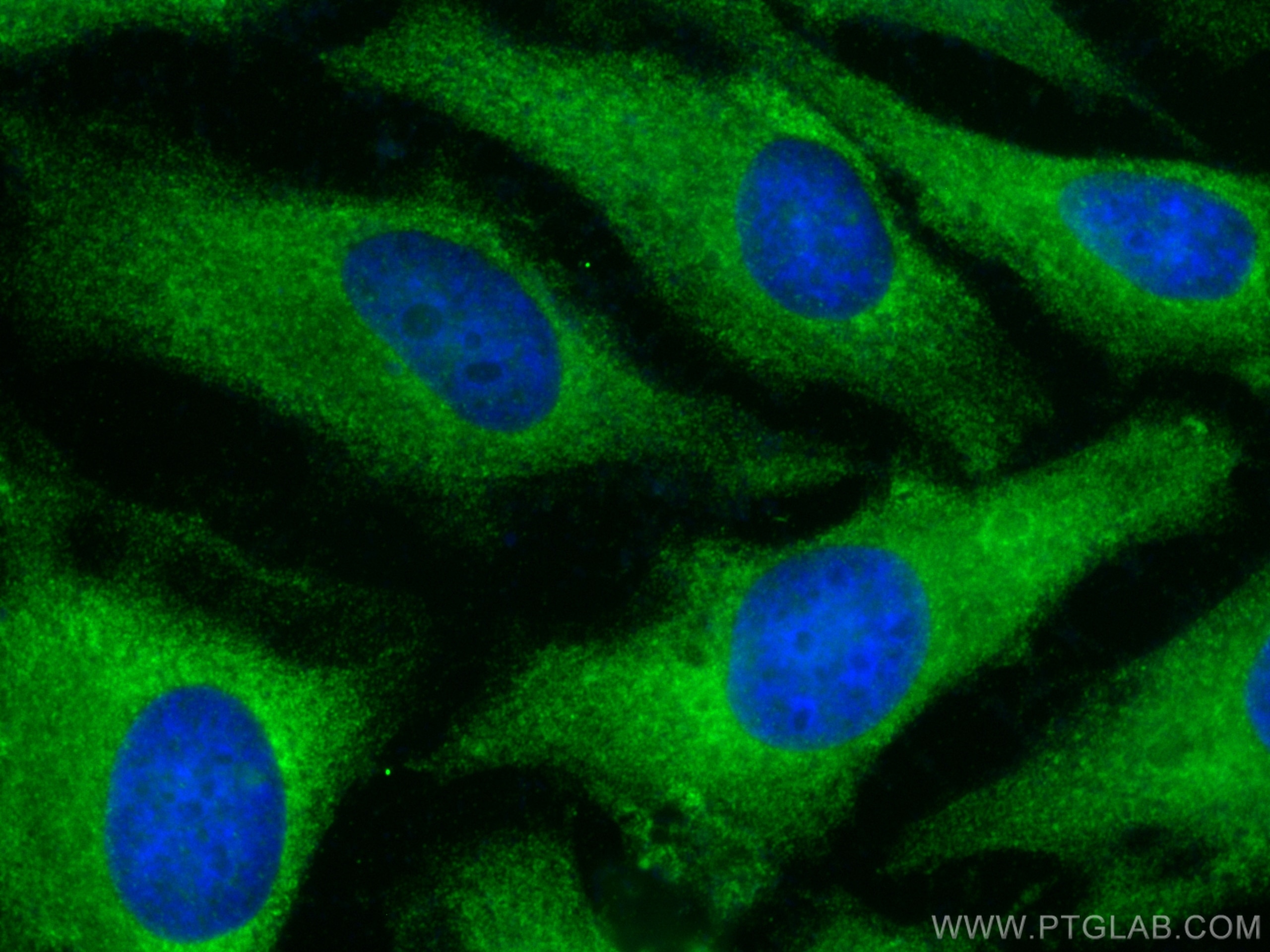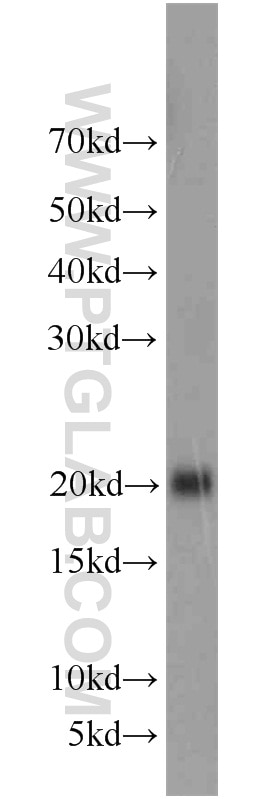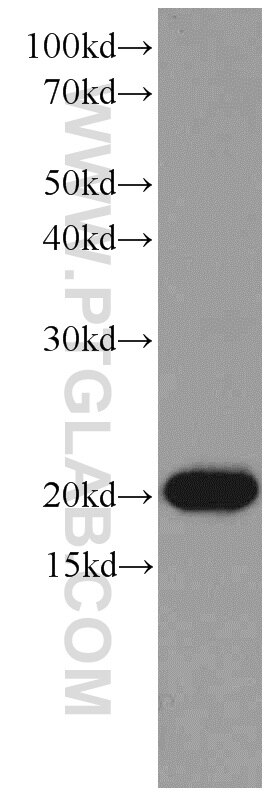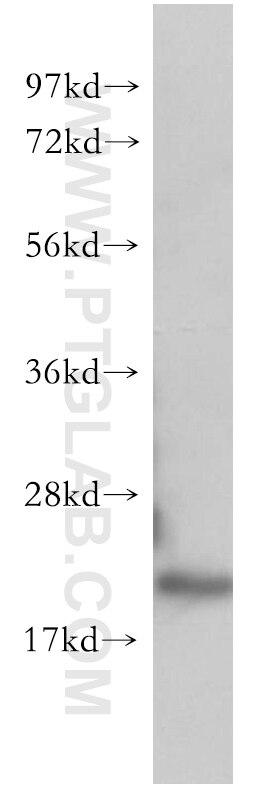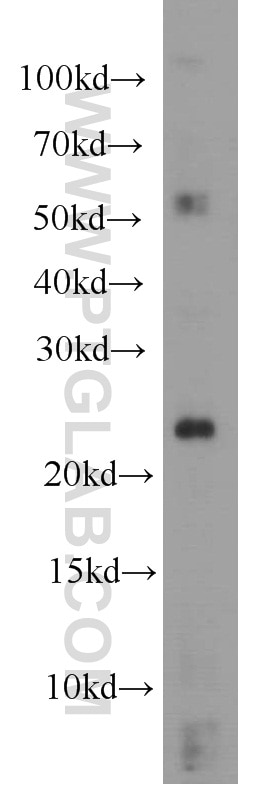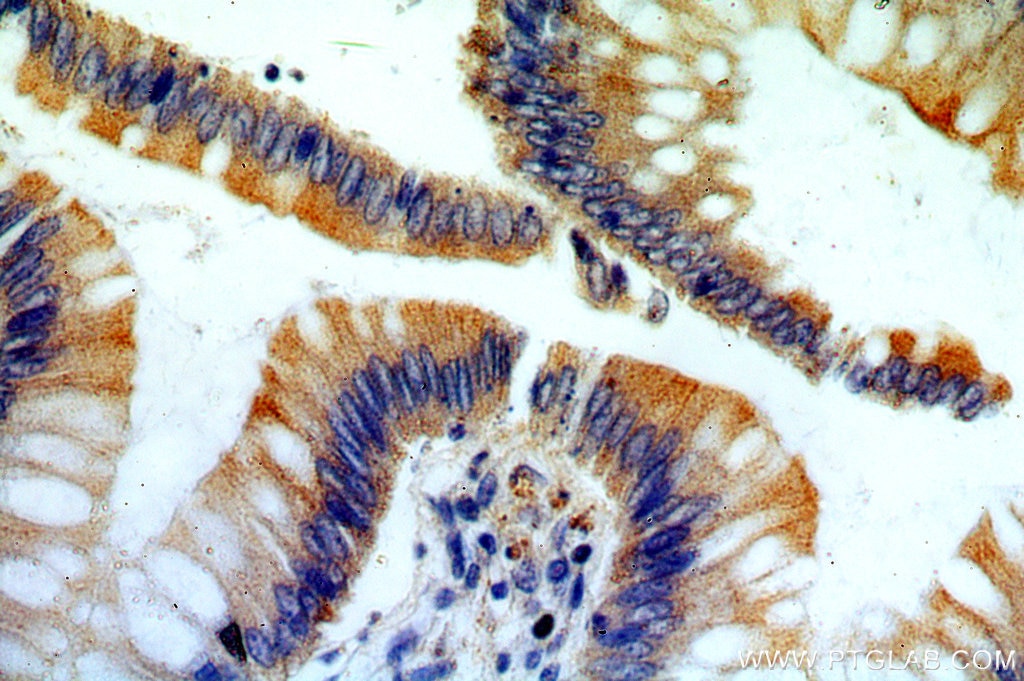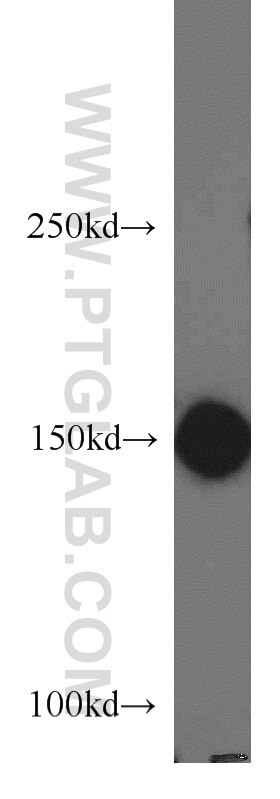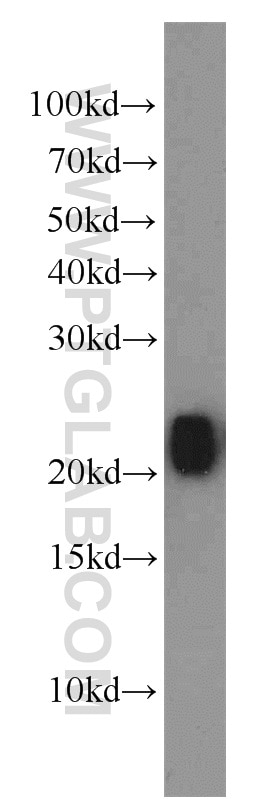- Featured Product
- KD/KO Validated
RHOA Polyklonaler Antikörper
RHOA Polyklonal Antikörper für WB, IF/ICC, IP, ELISA
Wirt / Isotyp
Kaninchen / IgG
Getestete Reaktivität
human, Maus, Ratte und mehr (2)
Anwendung
WB, IHC, IF/ICC, IP, ELISA
Konjugation
Unkonjugiert
Kat-Nr. : 10749-1-AP
Synonyme
Galerie der Validierungsdaten
Geprüfte Anwendungen
| Erfolgreiche Detektion in WB | HeLa-Zellen, fetales humanes Hirngewebe, HL-60-Zellen, HUVEC-Zellen, Maushirngewebe, MCF-7-Zellen, NIH/3T3-Zellen, PC-12-Zellen, Rattenhirngewebe |
| Erfolgreiche IP | Maushirngewebe |
| Erfolgreiche Detektion in IF/ICC | HeLa-Zellen |
Empfohlene Verdünnung
| Anwendung | Verdünnung |
|---|---|
| Western Blot (WB) | WB : 1:1000-1:8000 |
| Immunpräzipitation (IP) | IP : 0.5-4.0 ug for 1.0-3.0 mg of total protein lysate |
| Immunfluoreszenz (IF)/ICC | IF/ICC : 1:200-1:800 |
| It is recommended that this reagent should be titrated in each testing system to obtain optimal results. | |
| Sample-dependent, check data in validation data gallery | |
Veröffentlichte Anwendungen
| KD/KO | See 3 publications below |
| WB | See 128 publications below |
| IHC | See 15 publications below |
| IF | See 13 publications below |
Produktinformation
10749-1-AP bindet in WB, IHC, IF/ICC, IP, ELISA RHOA und zeigt Reaktivität mit human, Maus, Ratten
| Getestete Reaktivität | human, Maus, Ratte |
| In Publikationen genannte Reaktivität | human, Hausschwein, Hund, Maus, Ratte |
| Wirt / Isotyp | Kaninchen / IgG |
| Klonalität | Polyklonal |
| Typ | Antikörper |
| Immunogen | RHOA fusion protein Ag1141 |
| Vollständiger Name | ras homolog gene family, member A |
| Berechnetes Molekulargewicht | 22 kDa |
| Beobachtetes Molekulargewicht | 22 kDa |
| GenBank-Zugangsnummer | BC005976 |
| Gene symbol | RHOA |
| Gene ID (NCBI) | 387 |
| Konjugation | Unkonjugiert |
| Form | Liquid |
| Reinigungsmethode | Antigen-Affinitätsreinigung |
| Lagerungspuffer | PBS mit 0.02% Natriumazid und 50% Glycerin pH 7.3. |
| Lagerungsbedingungen | Bei -20°C lagern. Nach dem Versand ein Jahr lang stabil Aliquotieren ist bei -20oC Lagerung nicht notwendig. 20ul Größen enthalten 0,1% BSA. |
Hintergrundinformationen
What is the function of RhoA?
Ras homolog gene family, member A (RhoA) is a small GTPase that is involved in cytoskeleton organization.1 It is important in actomyosin contractility, as when RhoA binds to GTP it initiates a cascade of events mediating stress fiber or contractile ring formation, where actin bundles crosslink with other proteins. It is also associated with actin polymerization, making RhoA important in membrane ruffling and cell motility.2 The role of RhoA is essential in cell migration and adhesion.
What is the cellular localization of RhoA?
In motile cells, a leading edge stretches ahead, stabilizes, the cytoskeleton is reorganized, and the tail of the cell retracts. The role of RhoA in contracting actomyosin has linked RhoA with the tail retraction in this process, but studies into the spatiotemporal kinetics of GTPases have revealed that RhoA is also located at the leading edge of migrating cells.3 This highlights the dual roles of this protein in actin contractility and polymerization.
What is the role of RhoA in disease?
Though it is not an oncogene, the role of RhoA in adhesion and migration has implicated this protein in cancer biology. Expression of RhoA has been found to be higher in malignant tumors compared to benign tumors or in non-tumor tissue, and more invasive tumors have been found to overexpress RhoA.4 This protein is also implicated in neurodegenerative diseases and aging due to its role in axon guidance, with abnormal localization of RhoA associated with Alzheimer's and Parkinson's pathology.5,6
1. Ridley, A. J. & Hall, A. The small GTP-binding protein rho regulates the assembly of focal adhesions and actin stress fibers in response to growth factors. Cell 70, 389-399 (1992).
2. 21. Kurokawa, K. & Matsuda, M. Localized RhoA Activation as a Requirement for the Induction of Membrane Ruffling. Mol. Biol. Cell 16, 4294-4303 (2005).
3. 22. Struckhoff, A. P., Rana, M. K. & Worthylake, R. A. RhoA can lead the way in tumor cell invasion and metastasis. Front. Biosci. (Landmark Ed. 16, 1915-26 (2011).
4. 23. Mcglasson, S. et al. Rare variants of the 3'-5' DNA exonuclease in early onset TREX1 small vessel stroke [version 1; referees: awaiting peer review]. doi:10.12688/wellcomeopenres.12631.1
5. 24. Huesa, G. et al. Altered Distribution of RhoA in Alzheimer's Disease and AβPP Overexpressing Mice. J. Alzheimer's Dis. 19, 37-56 (2010).
6. 25. Hynds, D. L. Subcellular localization of Rho GTPases: implications for axon regeneration. Neural Regen. Res. 10, 1032-3 (2015).
Protokolle
| Produktspezifische Protokolle | |
|---|---|
| WB protocol for RHOA antibody 10749-1-AP | Protokoll herunterladen |
| IF protocol for RHOA antibody 10749-1-AP | Protokoll herunterladen |
| IP protocol for RHOA antibody 10749-1-AP | Protokoll herunterladen |
| Standard-Protokolle | |
|---|---|
| Klicken Sie hier, um unsere Standardprotokolle anzuzeigen |
Publikationen
| Species | Application | Title |
|---|---|---|
Nat Commun A mosquito salivary protein promotes flavivirus transmission by activation of autophagy. | ||
Circ. Res. Inhibition of KLF5-Myo9b-RhoA Pathway-Mediated Podosome Formation in Macrophages Ameliorates Abdominal Aortic Aneurysm. | ||
Acta Biomater Adipose-derived stem cells with miR-150-5p inhibition laden in hydroxyapatite/tricalcium phosphate ceramic powders promote osteogenesis via regulating Notch3 and activating FAK/ERK and RhoA | ||
Autophagy m6A mRNA methylation regulates testosterone synthesis through modulating autophagy in Leydig cells. | ||
Blood Annexin II interactions with the annexin II receptor enhance multiple myeloma cell adhesion and growth in the bone marrow microenvironment. | ||
Biomaterials Biocompatible PEGylated Gold nanorods function As cytokinesis inhibitors to suppress angiogenesis. |
